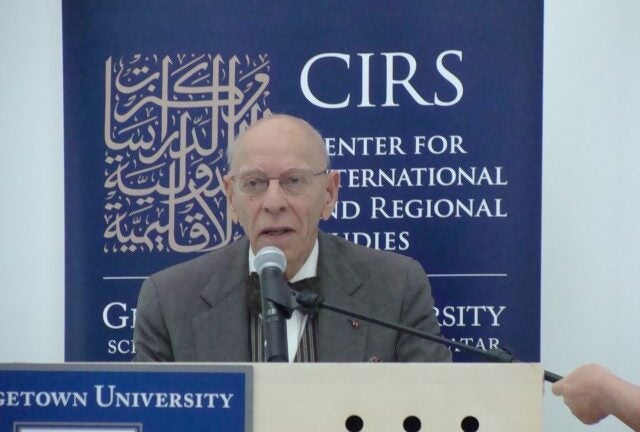American Studies, Dialogue Series, Regional Studies
Ibrahim Oweiss on the Global Depression and the Gulf Economies

Ibrahim M. Oweiss, Professor of Economics at the Georgetown University School of Foreign Service in Qatar, gave the February CIRS Monthly Dialogue lecture on the subject of “Current Economic Global Depression: Causes and Effects With Reference to the Gulf Economies.”
Oweiss began the talk by noting that he refers to the current economic crisis as a “depression” rather than the more commonly used term “recession,” because, he said, the fall-out from unemployment will be one of the most devastating features of the years to come. He gave various examples to demonstrate the negative effects of deregulation and emphasized that no country is immune from the global effects of the depression.
“There are many causes for the financial crisis,” Oweiss argued, “and one of them is the war in Iraq” that is a constant drain on financial resources and is costing the U.S. taxpayer dearly. Giving some recent figures, Oweiss calculated that “it costs 371,000 dollars every minute.” The war has created an unfathomable amount of debt and budget deficit to the U.S. economy. This crisis was a result of “the unwise fiscal policy during the Bush administration. Usually at a time of war, a country increases taxes, and not decreases them. George W. Bush inherited a surplus in the budget” and yet awarded tax cuts and with a mounting war, this “had a dual negative effect on the U.S. budget and on the National Debt.”
View the presentation from lecture below:
The Global Depression and Gulf Economies from Georgetown University School of Foreign Service in Qatar
The other obvious cause for the financial crisis, Oweiss pointed out, is the lack of government regulation in private equity and corporate affairs. This has had a devastating effect and has allowed people to act with impudence because, he said, “Americans have been used to buying with money they do not own,” and there will always be a problem when people overextend themselves and cannot pay back debts. Oweiss warned that “the crack in the U.S. economy is too wide and too deep to be filled by any amount of money, whether it had been approved under the Bush administration or now under the Obama administration.”
With reference to the Gulf economies, Oweiss stated that no economy is safe from the global economic crisis and the Gulf countries “are being affected to varying degrees.” According to the Oweiss Demand Curve theory, “petro-dollars are declining because the world’s industrial machinery is slowing down” hence the demand for oil and the prices of oil are also in decline. He argued that the effects for the GCC were also psychological and that Arab investors are used to following the pattern of global stock markets and will undoubtedly become discouraged by the negative outlook. “The GCC labor market” in particular, he added, “is bound to be reduced.” A variety of real-estate projects have been delayed or cancelled in the UAE in particular, costing 260 billion dollars, and losses to sovereign wealth funds in the region may reach 450 billion dollars. This, Oweiss explained “is equal to all petro-dollar revenues for the year 2008. Such losses are only on paper but can materialize if those invested assets are to be liquidated.” However, Qatar, due to years of immense expenditures and investments in natural gas and other important business ventures, will have a reasonable rate of growth in 2009 that will be of help to its economy.
A question Oweiss asked at the beginning of the lecture was “Is this the end of capitalism?”, and he answered it by saying that, contrary to French President Nicolas Sarkozy’s affirmative answer, it most definitely was not. If one defines capitalism, in its most basic philosophy, as being “an economic system allowing private citizens to own capital and to benefit from it,” then there will always be some form of capitalism. There are many shades, he said, between “unbridled individualism” and “regulated capitalism” and these need to be properly defined and applied.
On a positive note, Oweiss concluded that there have been many depressions in U.S. and world history, and that people have always managed, over time, to extract themselves from dire situations through overseeing a consistent program of proper regulation. Hope, he concluded, coupled with human ingenuity, unlike all other resources, is not finite.
Oweiss joined the faculty of the Department of Economics at Georgetown University in 1967 after having served on the faculty of the University of Minnesota and Western Maryland College. He was also a Visiting Professor of Economics at Harvard University and taught at Johns Hopkins University.
As an international economic advisor, he worked for several governments and multinational corporations in the USA and abroad. Dr. Oweiss was one of the founding members of Georgetown University Center for Contemporary Arab Studies as well as the College of Commerce and Economics at Sultan Qaboos University in Oman. Dr. Oweiss has authored over fifty scholarly publications including, Arab Civilization, and The Political Economy of Contemporary Egypt.
Article by Suzi Mirgani, CIRS Publications Coordinator.